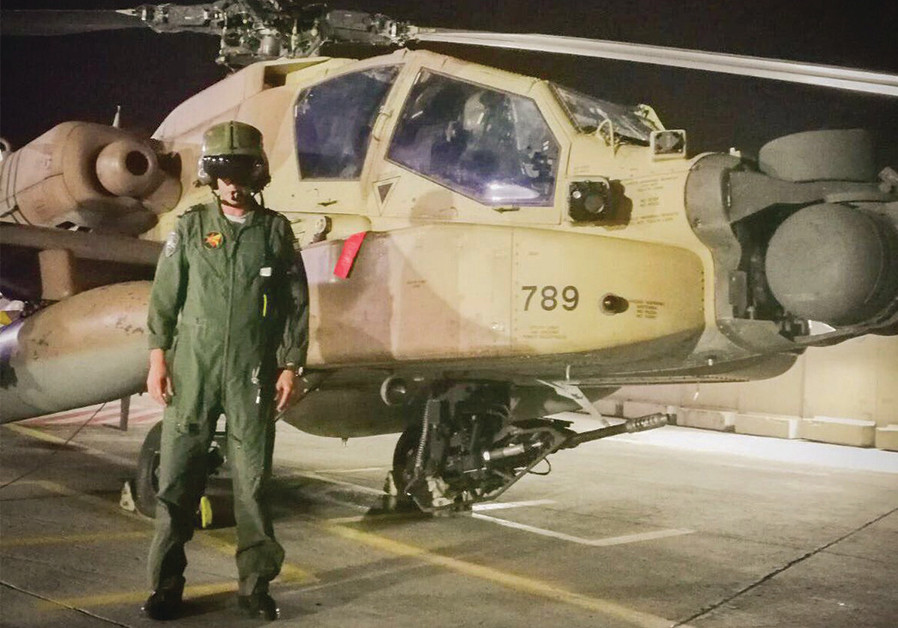IDF: Iranian drone we downed was on armed sabotage mission

Lt.-Col. L., the pilot who downed the Iranian drone over Israel early on February 10, 2018. (photo credit: IDF)
The Iranian drone which infiltrated into Israeli skies in early February was armed with explosives and was sent to carry out a sabotage attack in the Jewish State, the IDF Spokesperson’s Office said Friday.
“The interception of the Iranian unmanned aircraft by an attack helicopter prevented an Iranian intent to carry out an attack in the territory of the State of Israel,” read a statement by the army.
The advanced Iranian UAV was identified and monitored by Israeli defense systems until it was intercepted and “did not pose a danger” while it was inside Israeli territory, the army statement added.
The advanced Iranian drone believed to be a copy of a US stealth drone that was downed in Iran in 2011, took off from the T-4 airbase deep in the Syrian province of Homs and crossed into Israeli territory via Jordanian airspace.
The drone was spotted by Israel and was intercepted near the Israeli town of Beit She’an by an Apache attack helicopter.
IAF chief of air staff Brigadier General Tomer Bar, the second in command of Israel’s Air Force, said the drone was an advanced model with a low signature that Israel had never intercepted before.
“We waited for it to cross into our territory,” he said, stressing that it was important for Israel “to get our hands on the drone.”
According to the statement by the army, the conclusion was made following an analysis of the airfield as well as operational and intelligence research carried out on the remaining parts of the Iranian UAV.
Following the infiltration Israeli jets took off to strike the launch site of the drone as well as the drone control vehicle which guided the drone into Israeli territory and were met by massive Syrian anti-aircraft fire. Over 20 missiles were launched towards the Israelis jets from SA-5 and SA-17 batteries.
Pilots of one of the Israeli F16is ejected from their jet which crashed in the lower Galilee after being hit by shrapnel by the Syrian anti-aircraft fire. The pilots landed inside Israel and were evacuated to Rambam hospital in Haifa. Both have since been released from the hospital and the navigator has returned to flight duty.
It was the first time in 30 years that an Israeli jet was lost in a combat situation and led to an extensive retaliation by Israel with additional strikes against both the Syrian missile batteries and Iranian military targets in the war-torn country.
Tensions on Israel’s northern border have been rising in recent months as Israel fears that Iran is entrenching itself deeper into war-torn Syria with its presence on Israel’s borders growing in strength. The smuggling of sophisticated weaponry and the building a precision missile factory in Lebanon for Hezbollah has also been a growing concern for Jerusalem.
Last week Israeli reportedly carried out an airstrike against Syria’s T4 airbase, the same base where the drone took off from in February, killing seven Iranian Revolutionary Guard Corps soldiers.
According to the Russian military the strike was carried out by two Israeli F-15 jets with guided missiles fired from Lebanon’s airspace. Five out the eight missiles used were said to have been destroyed by Syrian air defenses.
Russian President Vladimir Putin was quoted by Sputnik news agency as stressing Wednesday on a phone call with Israeli Prime Minister Benjamin Netanyahu to respect Syria’s sovereignty and called for “refraining from any actions that might further destabilize the situation in this country and pose a threat to its security.”
Foreign Minister Sergei Lavrov had also criticized the strike, calling it “a very dangerous development.”
In Iran, senior Iranian official Ali-Akbar Velayati warned that the “Zionist crimes in Syria will not remain unanswered.”
Ali Shirazi, liaison for Iran’s Supreme Leader Ayatollah Ali Khamenei to the elite Quds Force, threatened that Tehran will destroy Israel if it doesn’t stop its “childish game.”
During a speech aired on Friday Hezbollah Secretary General Hassan Nasrallah warned that following the strike Israel was now in a direct confrontation with Iran, calling it a “critical juncture in the history of the region.”
“Let them make no mistake now: they are now [fighting] face to face with the Islamic Republic in Iran,” he said.





Comments are closed.